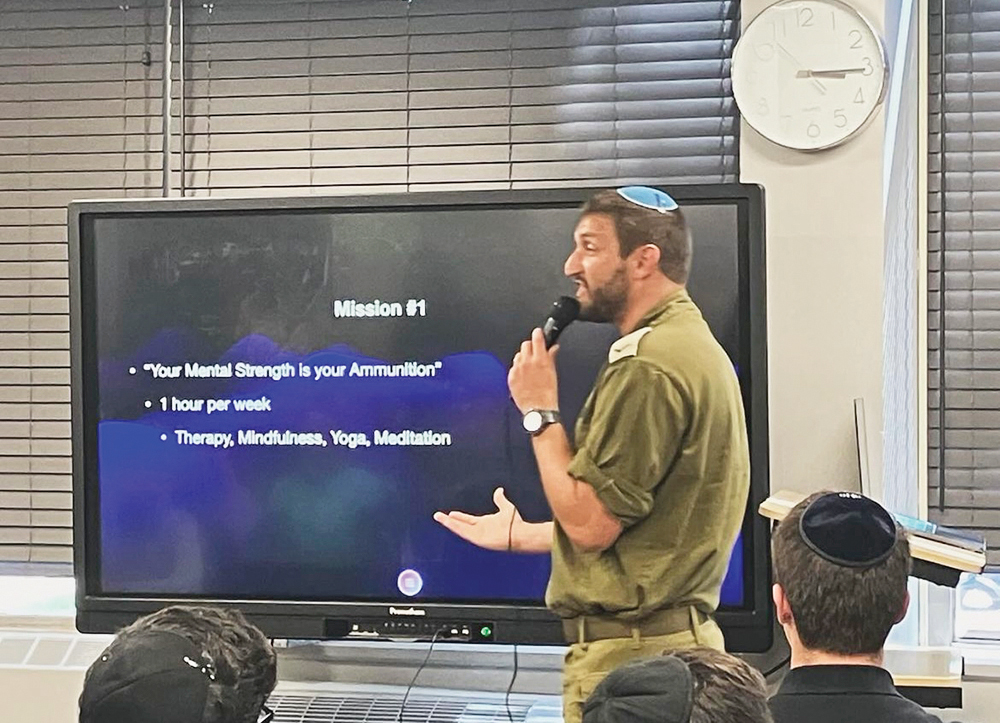
Arky Staiman, the well-known American-born Israel tour guide, IDF soldier, Instagram influencer and motivational speaker, has just completed a three-week speaking tour in America. The IDF allowed him this time to travel in order to inspire and help bridge the gap between American and Israeli Jews. He delivered over 40 presentations to two or three schools a day and to a shul or a community at night.
“It’s been amazing,” Arky said. “Every event I have done has been sold out, standing room only—a packed house. I talk to people who just want to say thank you.”
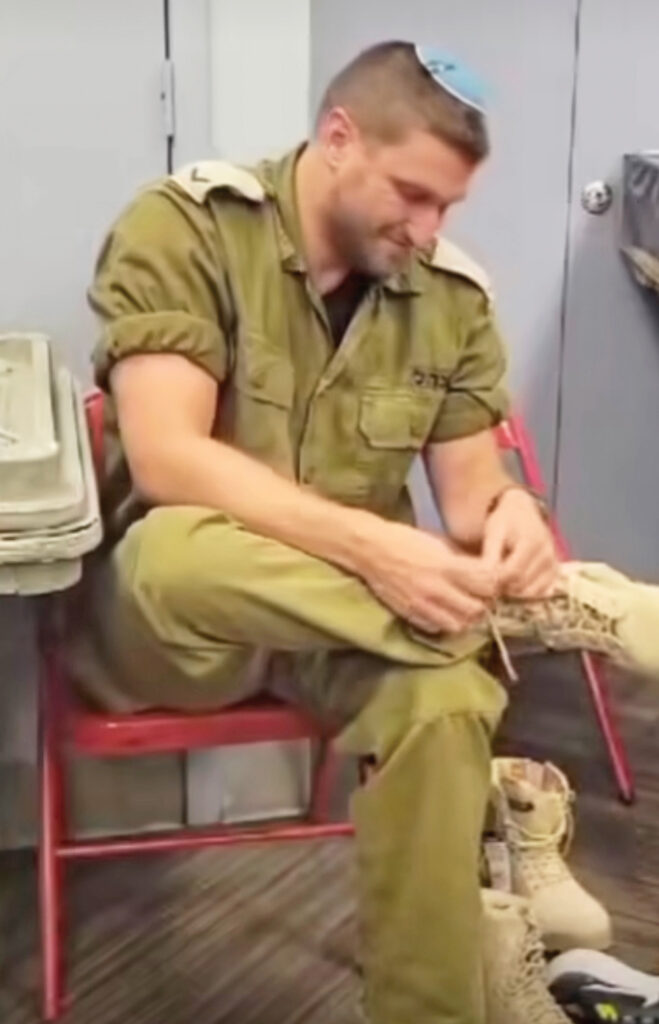
Arky relayed that upon his return to Israel, he will be getting his gun and going straight back into Gaza. “Teaneck to Jabaliya,” he said with a laugh.
He spoke in New Rochelle last week. Arky explained that upon much reflection, his experience taught him the importance of five different values that he would like to introduce as his “missions.” He has taken on these missions himself and he encourages his audiences to take them on as well.
Arky explained how he came to make aliyah and join the IDF. When he was a teenager growing up in Baltimore, he fell in love with Israel. He was particularly inspired by the soldiers who left their American homes to join the Israeli army. I want to be that guy, he said to himself.
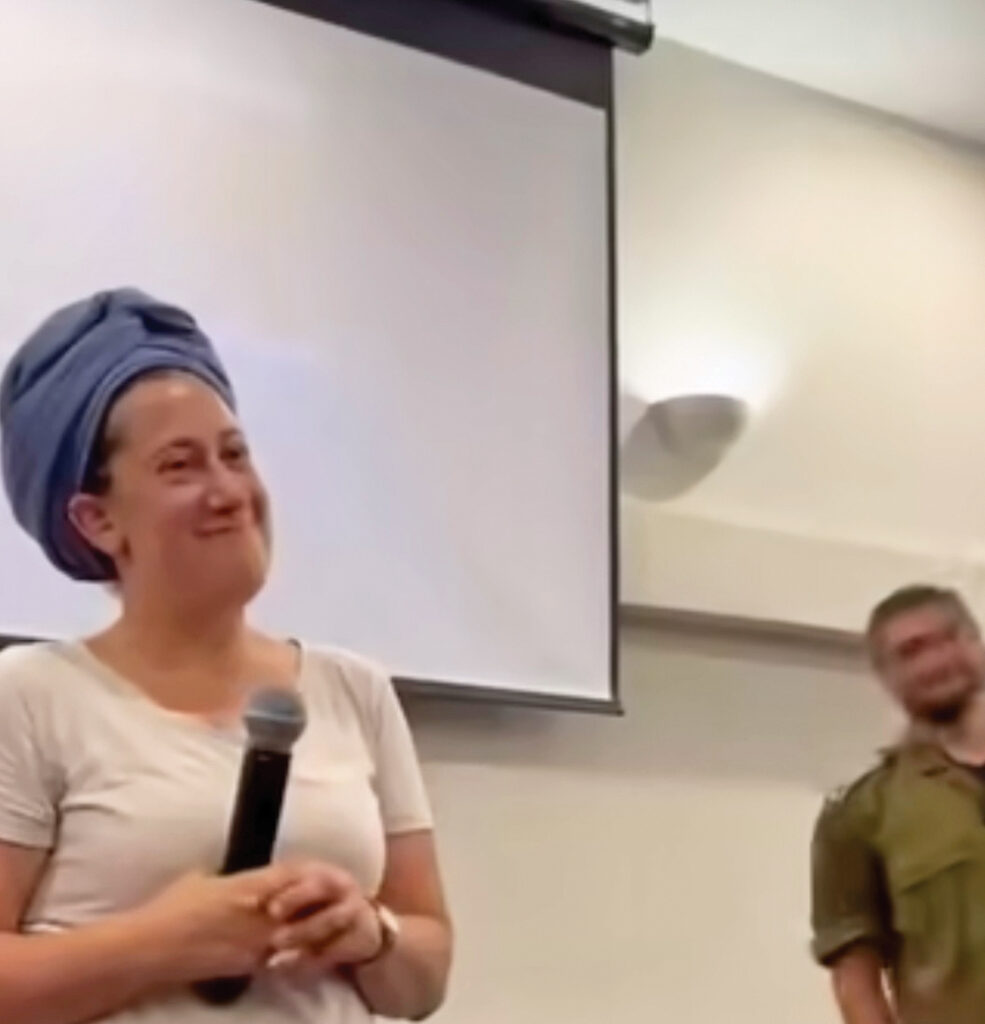
“In 12th grade, I was sitting with a college counselor who was saying, ‘This is your reach school, this is your target school, and this is your safety school.’ I said, ‘What are you talking about? I’m not doing this. I’m going to the army.’” After he graduated, Arky attended Yeshivat Lev Hatorah and then switched to a hesder yeshiva, which immersed him into Israeli culture and set him up for drafting into the IDF. “It was then that I really became Israeli.”
Arky served as a paratrooper in the IDF. When his official army service was over, he got married, had kids, got a job as a tour guide, and went back to the army for two weeks every year for his reserves duty (miluim). He had expected to continue as a paratrooper in reserves, but the army switched his job to “search and rescue” for fallen soldiers. “That meant that my job would be to go behind enemy lines to make sure that Jews who gave their utmost sacrifice for the Jewish people came back for a Jewish burial,” Arky explained. “I first thought this was too serious for me. But my father told me that my grandfather had been a member of the chevra kadisha, and my zeidie on the other side, a Holocaust survivor, had been forced by the Nazis in Auschwitz to take care of the remains of the Jews they killed. So, the idea that 80 years later, his grandson would be in charge of making sure that Jews come back for a Jewish burial was powerful.”
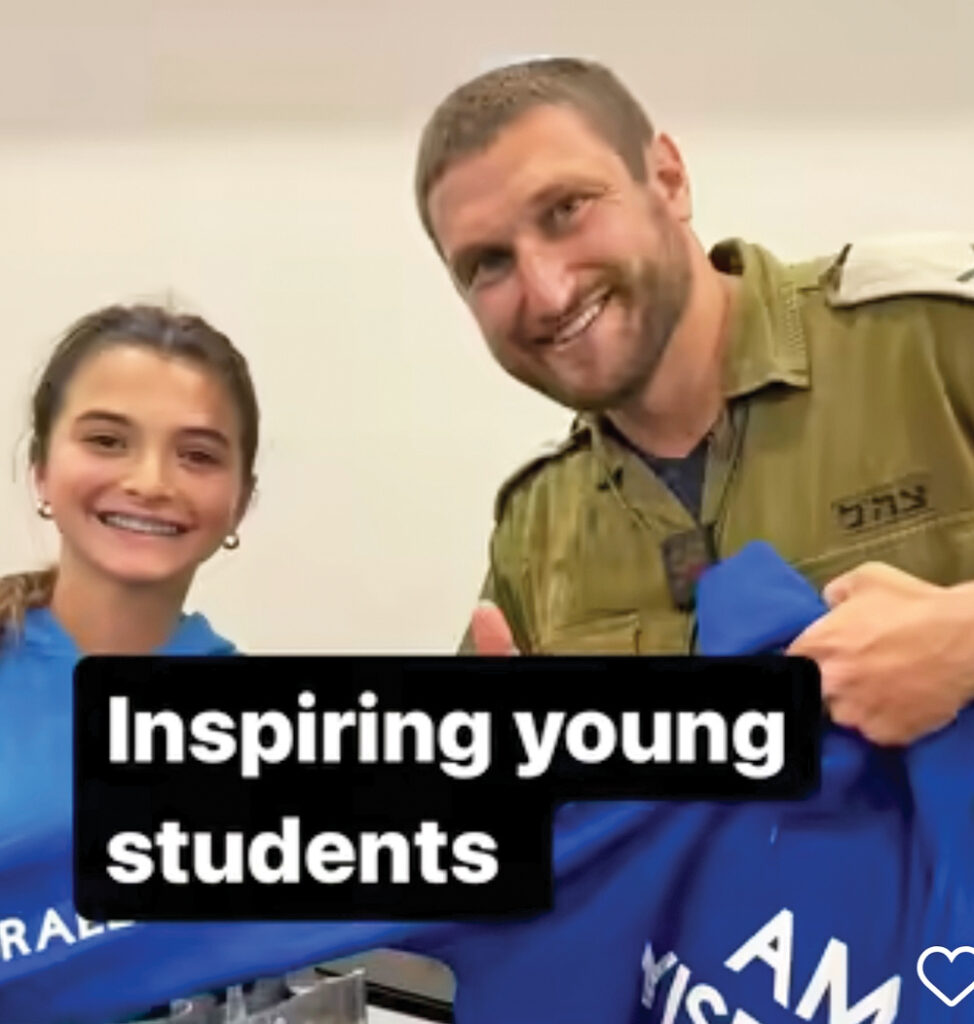
On October 7, Arky got the call to serve during the third hakafa in shul.
“When we got to Kfar Aza on October 7, we got out of our Hummer and knew what our job was. We said: ‘This will be awful. But it will be temporary, and we will get through it together.’ Why were we doing this meditation in the middle of a war zone? It’s because my unit takes mental health so seriously. Mental strength is our ammunition.”
Arky then talked of an important training session that they had gone through prior to October 7, when a trauma specialist trained them. The trauma specialist had taught the soldiers how to control their mindsets with breathing. He taught them that they should take a minute to breathe before going into something difficult, and remember three things: One: It’s going to be bad. Two: It’s going to be temporary. And, three: It has a purpose.
Arky concluded his story with his first mission: “If we could stop to breathe in the middle of a battlefield to calm ourselves down, then you all can do it in your lives.” Arky then suggested that audience members spend one hour a week maintaining and improving their mental health with meditation, therapy, yoga or whatever works for them.
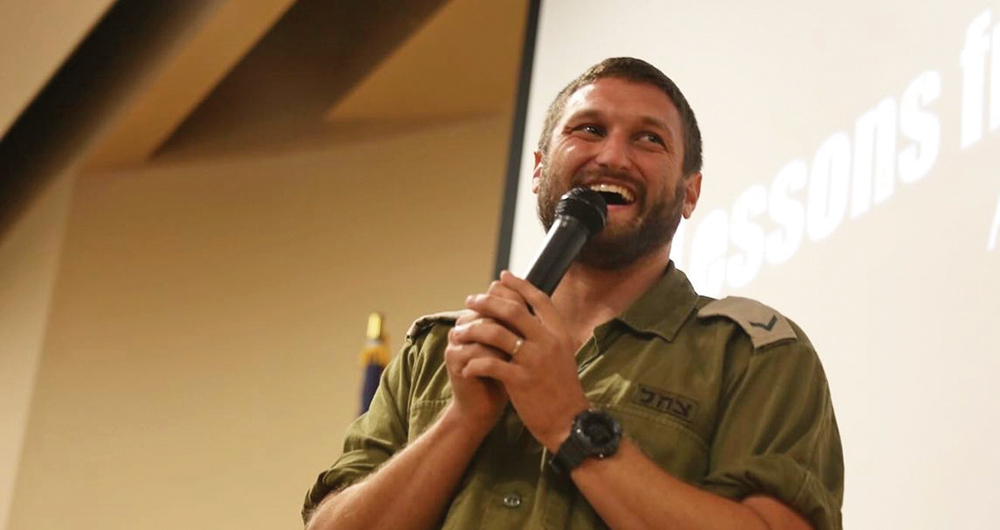
Arky then shared his second mission: to be physically strong and healthy. “You will all have situations where you will need to be strong and healthy—playing with your kids, or grandkids.” He then suggested two hours of exercise a week.
Arky translated the song his unit would sing on the way in and out of Gaza: “ ‘Even in the darkest places, that’s where God can be found.’ He then showed a photo on the screen of a house in Kfar Aza that he and his friend were about to enter. His friend suddenly called out, “Arky! There’s a wire!” They called the bomb squad, who confirmed that the house was indeed booby-trapped. One more step and the house would have blown up on them. “We felt nissim—miracles. But I also felt anger towards Hashem. We were collecting fallen soldiers, good people, people who sacrificed their lives for Am Yisrael. Where was their nes? They didn’t get saved. For every nes since October 7, there was an anti-nes too—when Hashem didn’t save good people.
“I grew up learning a lot of stories with the theme: A good person did a good thing and Hashem saved him for it. … do they allow us to be ready for the day when that doesn’t happen? When that day comes when you’re davening and it doesn’t come to fruition, do you still feel Hashem? Or are you saying: ‘I now have to rethink everything.’ I realized I wasn’t angry at Hashem. I was angry at what I was told about Hashem. It was an imbalance.”
This brought Arky to present his third mission. “I then understood that when we educate our children, we need to prepare them for the good days, but also for the bad days—to remind them that Hashem is with us on both of those days. How do we develop that relationship with Hashem? Communication—talking to God. Develop your relationship with Hashem. Speak to Hashem in your own language, in your own words, coming from your heart. You don’t have to be in a forest or shul, lighting candles, or saying Tehillim to speak to Hashem.”
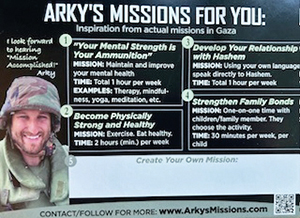
Arky then introduced his fourth mission. “There’s no way I can talk about the war without talking about what it does to our families. My baby said his first word while I was in Gaza: “Abba.” But he is referring to the phone and the computer when he says “Abba,” because that’s how he knows his Abba. And I do come home, but then I leave again. Which brings me to the greatest heroes of all: the army wives. They have the hardest jobs. My wife has to hold the whole house up physically, emotionally, spiritually—in every possible way. Not knowing whether her husband is ok, when he’s going to come back, if he’s going to come back, and whether he’s going to be ok physically or mentally. She has to put all that worry aside in order to be there for the kids.
“And it wouldn’t be fair if I didn’t talk about what it’s like when I do come home, and she is finally expecting all that weight to lift off her shoulders. She is expecting her husband to be present with her and with the kids. But the truth is, I come home and my head is not there. My head is with my guys in Gaza. It’s a shell of a person that comes home. I’m actually still dealing with that today. I’m here with you, but just this past week, my team—my guys—brought back the bodies of seven hostages from Gaza. So I’m here but I’m not really here. I want to be somewhere else. It’s the same for my wife when I go home. So when people ask, ‘How can we help the soldiers?’ I say, ‘Help their families. Sponsor a meal—or a babysitter, or cleaning help.’”
This brought Arky to his fourth mission: Strengthen your family bonds. He suggested that for at least 30 minutes a week, the audience spend one-on-one time with each of their kids, letting the kids decide what to do, putting away the phone, and ignoring all chores. Simply focus on the kids.
In preparation to speak about his final mission, Arky told about a particular night when his unit had to go to a cemetery in an unsecured area in Khan Younis, under Hamas fire. Intelligence had found that Hamas had buried hostages in the cemetery, and Arky’s unit had to bring them back. “Knowing that we were on our way to that mission, we passed billboards that read: “Bring Them Home Now.” I thought: We are bringing them home now. And while it’s so tragic to bring back their bodies, the families need it. It’s a huge nechama for them to give a proper burial to their loved ones, to sit shiva, to have a grave to visit. We also want to get the bodies out of Hamas’s hands, so they don’t try to trade them for terrorists.
“We were squished into a tiny tank on the way to the cemetery and we heard massive rounds of artillery being shot at the tank from all sides. But still, we felt so proud to be there and didn’t want to be anywhere else. I have been afraid in my life, but that was not one of those times. … we all knew and deeply felt our tafkid—our mission—that night. When you feel that, you go towards it 120 %. You know you are exactly where you’re supposed to be, doing exactly what you’re supposed to be doing. That takes away the fear. If we were going to die that night—is there a better way to go?
“The mission was a success. We got out of the tank while they were firing over us. The teams around us were creating firepower so that Hamas would focus on them and not on us. We were literally holding shovels in our hands and our job was to look down and focus.
“So much of life is looking inside yourself and saying: what makes me special? What do I bring to the table? That’s my call to action: Everybody, look inside and say: what makes me special? You have some special talent or ability, figure out what it is—and do that something. Use it for good, at least until the war is over, and then afterwards too. Please—create your own mission.”
To learn more about Arky, visit: www.israelwitharky.com
Or @israelwitharky on Instagram









